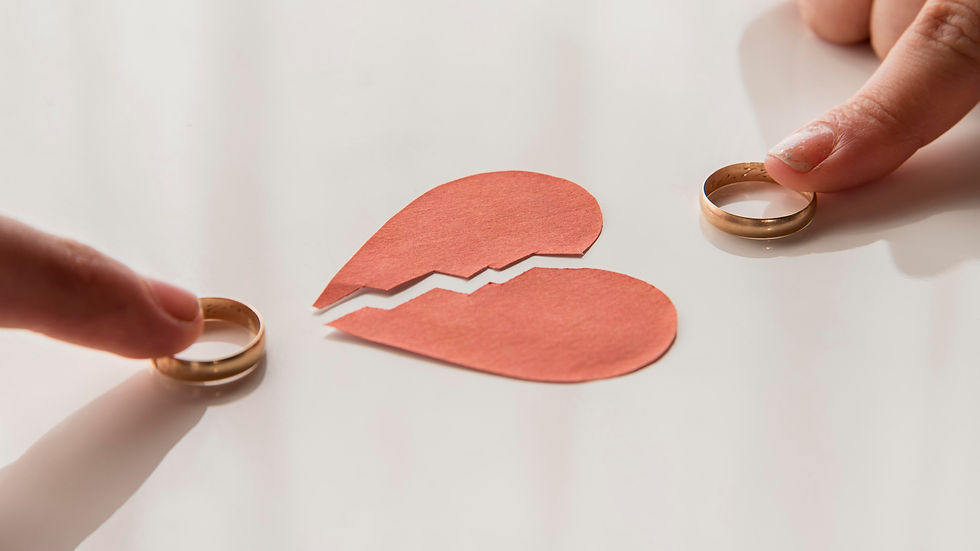The Hidden Grief in Divorce and Separation: 8 Losses You Might Not Have Realised You’re Mourning
- Kimberly Freeman, BA.Psych, Dip.Couns, Registered Counsellor

- May 18, 2025
- 4 min read
Updated: Nov 17, 2025

By Kimberly Freeman, Registered Counsellor — Shifting Perspective Counselling, Sunshine Coast
Update November 12, 2025
When Divorce Feels Like Grief
If you’ve been through a divorce or separation, you might be surprised by how deeply sadness, confusion, or even relief can mix together. You may tell yourself it’s “for the best,” yet still feel a painful emptiness, a quiet grief that can’t be explained easily.
That ache isn’t weakness or regret. It’s grief.
Many people don’t realise that divorce can bring the same emotional pain as death — because in many ways, it is one. The loss of a shared life, identity, and future. As a counsellor specialising in grief and loss, I often see clients who are unsettled by how strong their emotions are, even when they were the ones who initiated the separation.
Grief after divorce is valid, common, and complex. And one of the most powerful steps in healing is naming what you’ve lost. Below are eight hidden losses people often experience during divorce — many of which are rarely talked about.
1. Grieving the Loss of Companionship After Divorce
Even in strained relationships, daily routines like morning coffee together, shared jokes, someone to text about your day, create a sense of comfort and connection. When that disappears, loneliness can hit harder than expected. Missing companionship doesn’t mean you want the relationship back, it means you miss being known.
2. Mourning the Future You Planned Together
You may have built a vision of your shared future: holidays, milestones, growing old side-by-side. When those dreams collapse, it’s not only your partner you grieve it’s also the version of life you imagined. The loss of that roadmap can leave you feeling directionless and uncertain about what comes next.
3. Losing Your Identity After Divorce
For many, being a husband, wife, or partner becomes part of who they are. When that ends, it can bring a quiet identity crisis: Who am I now? Alongside this comes guilt, shame, or discomfort about how others see your new role. Rebuilding your identity is a process of rediscovery, not something to rush or hide from.
4. When Divorce Changes Your Home and Daily Life
Divorce often means letting go of a familiar home, splitting finances, or losing beloved routines. The smell of your old kitchen, the sound of laughter in shared spaces, even your weekend rituals, all of these are tied to memory and meaning. Mourning these physical and symbolic losses is a normal part of adjusting to your new chapter.
5. The Grief of Losing In-Laws and Shared Friends
Divorce doesn’t just end a marriage; it often shifts entire social circles. You may feel isolated when in-laws or mutual friends drift away or take sides. These secondary losses can deepen your loneliness just when you need connection most. Rebuilding your support network takes time, but it’s possible — often beginning with one safe space to talk.
6. Missing the Emotional Closeness You Once Had
Even in difficult marriages, there are moments of warmth — laughter, physical closeness, or simply being known by someone who has seen all parts of you. When that intimacy disappears, it can feel like another kind of loss. You can grieve what was good while acknowledging what wasn’t.
7. Rebuilding Emotional Safety and Trust After Divorce
If your separation involved betrayal, conflict, or sudden change, your sense of safety may be shaken. You might doubt your ability to trust again — in others or in yourself. Healing this form of grief takes patience and gentle self-compassion, often supported by a trusted counsellor who can guide you through rebuilding confidence and trust.
8. Grieving the Person You Used to Be
Finally, there’s the loss that happens within you. The version of yourself you were in that relationship. Maybe that self felt hopeful, secure, or deeply connected. Mourning who you once were doesn’t mean staying stuck in the past, it’s an act of honouring your journey and making space for who you’re becoming.
Take a Pause
You might notice some of these losses resonate more than others. That’s okay. Grief after divorce doesn’t arrive all at once. It shows up in waves, sometimes when you least expect it. Allow yourself to feel each layer without judgment.
You’re Not Overreacting. You’re Grieving
If any of this sounds familiar, know that what you’re feeling is valid. Divorce grief isn’t dramatic or “too much” — it’s a human response to losing something meaningful. Grief doesn’t follow a set timeline, and it doesn’t look the same for everyone. Whether you feel sadness, anger, relief, or guilt, each emotion is a natural part of healing.
How Counselling Can Help After Divorce
Counselling offers a safe, supportive space to:
Name and process hidden losses
Understand emotions like anger, guilt, or numbness
Rebuild your identity and self-worth
Develop coping tools for emotional safety and trust
Learn to communicate your needs and boundaries
Many of my clients find that grief counselling after divorce helps them move from confusion and overwhelm toward clarity and peace.
If you’d like gentle, confidential support as you navigate this transition, you can book a counselling session on the Sunshine Coast or online.
Final Thoughts: Healing from the Hidden Grief of Divorce
Divorce grief isn’t just about the end of a relationship — it’s about the many invisible threads that once wove your life together. By naming each loss, you begin to reclaim your story and open space for healing, growth, and new beginnings.





Comments